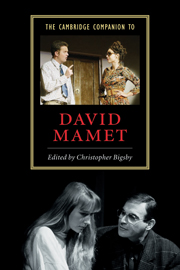Book contents
10 - David Mamet and film
Published online by Cambridge University Press: 28 May 2006
Summary
Playwrights became involved in the cinema early in the twentieth century when the new medium was scarcely a decade old, and there are few dramatists who have not been courted by a film industry eager to adapt their work or employ them as screenwriters. At first theatre people condescended to the prestige-seeking movie moguls, and the results were frequently unsatisfactory. Just after the First World War Samuel Goldwyn lured the Nobel Prizewinning Maurice Maeterlinck to Hollywood with unhappy consequences, and he had no greater success with George Bernard Shaw who famously rejected his overtures (“There is only one difference between Mr Goldwyn and me. Whereas he is after art, I am after money”). However, Shaw's fascination with the movies was later to involve him in adapting three of his plays in collaboration with the Romanian charlatan Gabriel Pascal.
David Mamet, born in 1947, three years before Shaw’s death, belongs to a generation that grew up after the cinema and television had decisively replaced the theatre as the dominant forms of public entertainment. His primary commitment may be to the stage, but since the early 1980s he has established a parallel career in the movies matched by no more than a handful of dramatists of comparable distinction. One thinks of Sacha Guitry and Marcel Pagnol in France (both chiefly interested in bringing their plays to the cinema-going public with the least interference); of Robert E. Sherwood in the United States (a distinguished film critic, a recipient of three Pulitzer Prizes for drama, an Oscar-winning screenwriter, a speechwriter for Franklin Roosevelt); and two British dramatists Mamet admires, Terence Rattigan and Harold Pinter.
- Type
- Chapter
- Information
- The Cambridge Companion to David Mamet , pp. 171 - 193Publisher: Cambridge University PressPrint publication year: 2004
- 1
- Cited by

